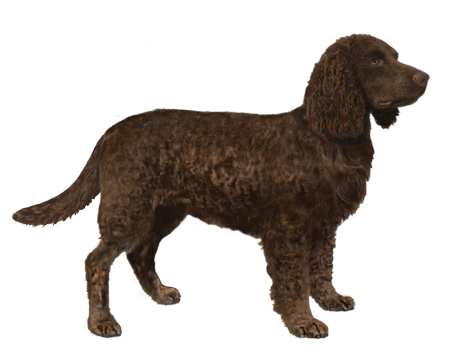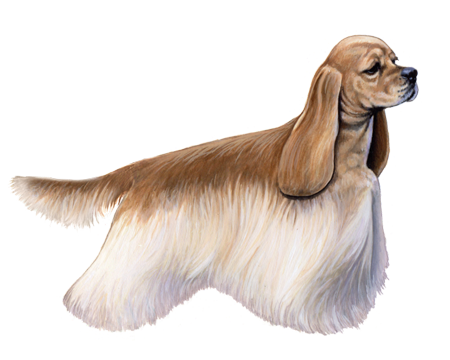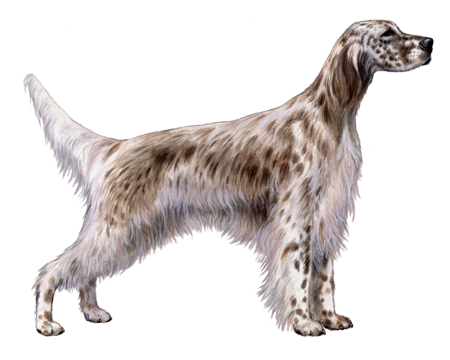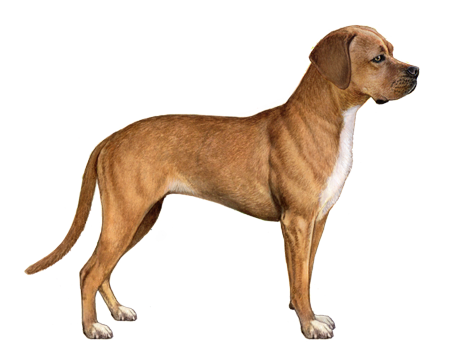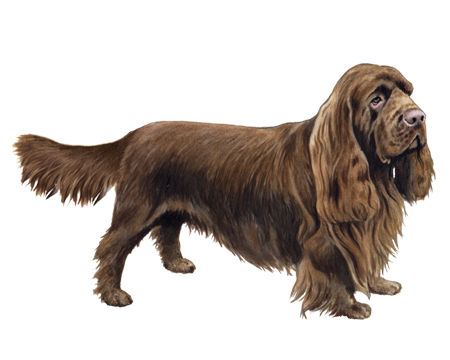
German Wirehaired Pointer
The German Wirehaired Pointer is a smart, energetic breed with a distinctively bushy beard and eyebrows. These dogs make loyal, enthusiastic, and handsome hunting companions and family pets.
Interested in discovering if your dog is a German Wirehaired Pointer?
Check out Wisdom Panel's DNA tests.

German Wirehaired Pointer Traits
General Appearance
German Wirehaired Pointers are muscled, sturdy dogs best known for their weather-resistant, wire-like coats, bushy beards, and eyebrows.
Coat and Colouring
The German Wirehaired Pointer's coat is both functional and distinctive. The harsh, wiry outer coat is weather-resistant and somewhat water-repellant. During the winter, the undercoat is dense enough to protect the GWP from the cold. In the summer months, this undercoat thins out significantly.
The GWP's coat is liver or parti-color with white—including patches and ticking. Its head is always liver-color, though a white blaze is possible.
Distinctive Physical Traits
German Wirehaired Pointers have medium-sized, oval, brown eyes. They're bright, clear, and—most notably—overhung with medium length eyebrows. The breed's ears are rounded (but not too broad) and hang close to the head. The tail is set high and carried in line or above the body when the dog is alert.
German Wirehaired Pointer Temperament
The German Wirehaired Pointer is an excellent breed for active people and families looking for an affectionate, loyal, high-energy pet.
Far from couch potatoes, German Wirehaired Pointers need plenty of outdoor exercise to be happy. A bored GWP can easily turn to a destructive one. Giving them "jobs" to do around the house will help keep them from destructive behaviors, such as barking or digging.
German Wirehaired Pointers form tight bonds with their people. If they live in a home with only one person, they may turn into a one-person dog. But if raised among family, they will bond with the whole group. More than anything, GWPs enjoy human companionship and want to be included in activities as much as possible.
This breed is usually friendly toward other pets. But because of their sporting dog heritage, German Wirehaired Pointers often chase wildlife. Though sometimes aloof with strangers, they make commendable watch dogs.


German Wirehaired Pointer History
The German Wirehaired Pointer, also known as the Deutsch Drahtaar, received official recognition in its German homeland in the 1920s.
Unlike British gamesmen—who were breeding specialized dogs that excelled in specific types of hunting—hunters of Continental Europe wanted breeds that could do it all. Breeders combined the Griffon, Stichelhaar, Pudelpointer, and German Shorthaired Pointer—each of which came about in the late 1800s. The resulting dogs could point and track game, retrieve waterfowl from land or water, confront vermin, and more.
The German Wirehaired Pointer came to the United States in the early 1920s and received American Kennel Club recognition in 1959. Though the breed isn't too popular in the U.S., it has a large following in Germany.
German Wirehaired Pointer Care
Nutrition
To meet the nutritional needs of your German Wirehaired Pointer, feed a high-quality food that's appropriate for their life stage (e.g., puppy, adult, senior) and activity level.
Keep them at a healthy weight by monitoring their food intake and measuring out meals. And don't forget to account for treats in their daily calorie totals. As a guideline, treats should make up no more than 10% of a dog's calories.
Grooming
The German Wirehaired Pointer's grooming needs are relatively low-maintenance. Weekly brushing with a comb and soft slicker brush is usually enough to keep their coats free of loose hair and dirt.
You should clip your dog's nails regularly to keep them short and tidy. Overgrown nails can split and become painful, or lead to issues walking or running.
In addition to professional dental cleanings, aim to establish an at-home dental care routine that includes regular teeth brushing. Maintaining good dental hygiene is essential for the overall long-term health of all dogs.
Exercise
German Wirehaired Pointers are busy dogs that have higher exercise needs than many other breeds. Long daily walks, playtime in enclosed yards, hiking, and swimming are all outdoor activities that they enjoy.
Thanks to their background, GWPs love to hunt and retrieve. Throwing a tennis ball or frisbee for them to retrieve provides exercise and lets them show off their natural abilities.
German Wirehaired Pointers also enjoy participating in dog sports such as field trials, tracking, agility, and competitive obedience. These mentally stimulating activities can give your dog a productive outlet for their energy.
Training
German Wirehaired Pointers are responsive and extremely eager to please. Such characteristics make them relatively easy to train. However, they can have an independent streak and will sometimes only work for someone they like.
Starting from an early age, consistent, firm training and positive reinforcement techniques are the best tools for success. As with all breeds, German Wirehaired Pointers benefit from early socialization. Socialized puppies grow up to be well-mannered adult dogs.

German Wirehaired Pointer Genetic Health Conditions
-
von Willebrand's Disease, type 2
von Willebrand's Disease (vWD) type 2 is a blood clotting disorder that causes moderate to severe bleeding tendencies due to low level and abnormal structure of von Willebrand's factor.
Knowing if your German Wirehaired Pointer is a carrier or at-risk for these conditions can help you and your veterinarian plan for your pup's lifelong care. With Wisdom Panel™ Premium, you can get results for over 200 genetic health tests.
Breed Group
Sporting
The sporting group breeds are incredibly diverse in personality and appearance, but can be characterized as very sturdy. They were developed to work closely with people and in general have a very responsive nature and high intelligence.




